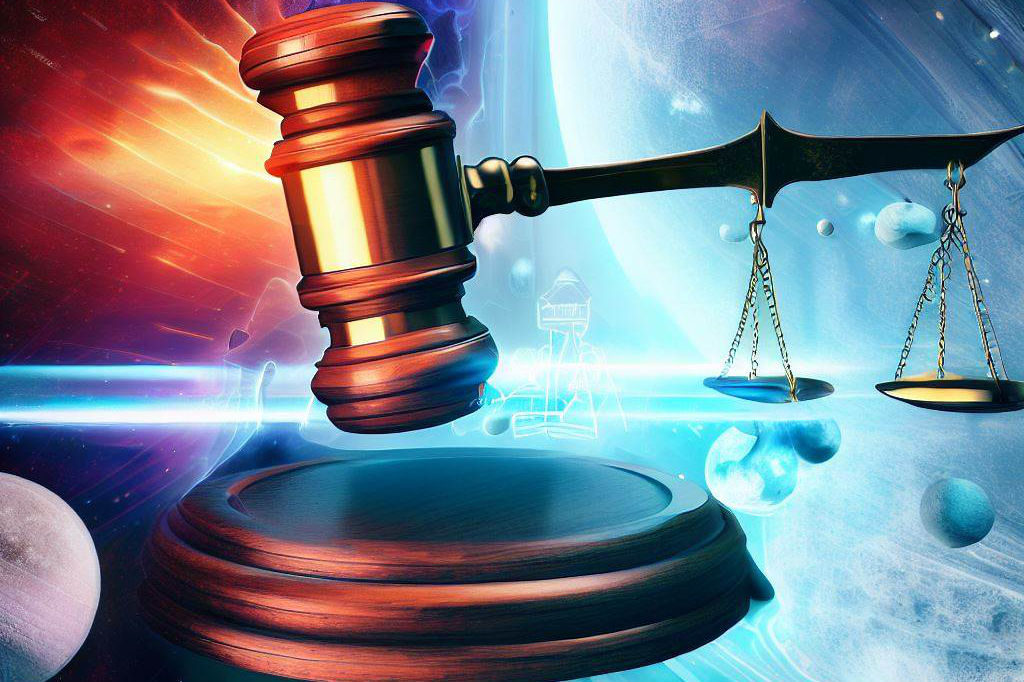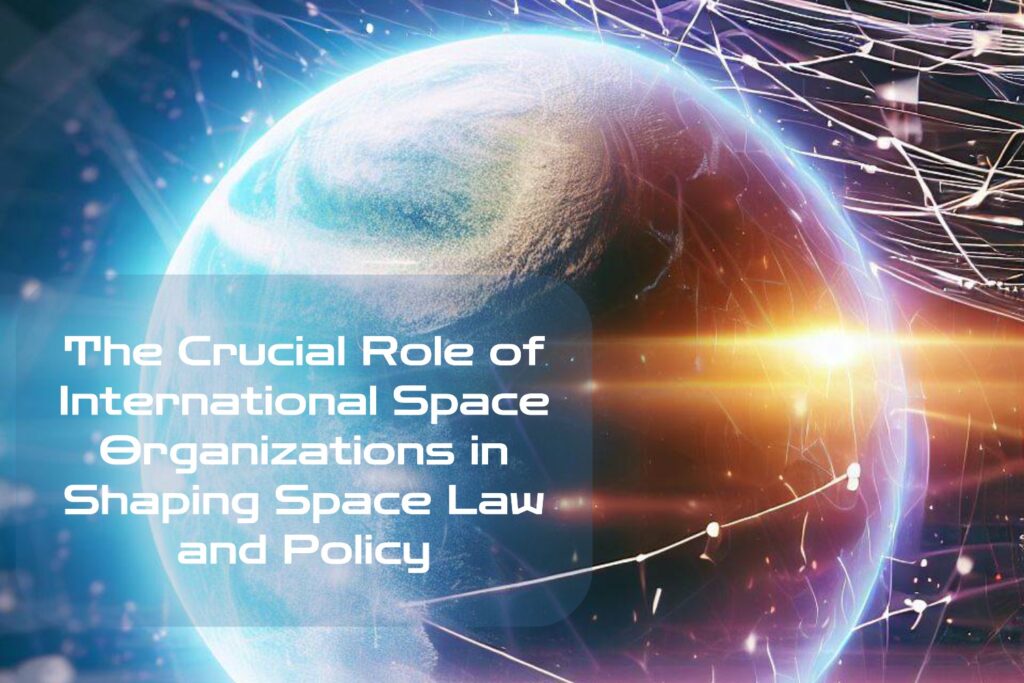The Importance of Space Law and Policy
Space exploration is not just a scientific endeavor; it is also a political and economic one. As humankind pushes the boundaries of space, issues related to ownership, access, and use of space resources naturally arise.
To address these concerns, countries worldwide have developed legal frameworks that seek to regulate human activities in outer space. These legal frameworks are collectively known as space law.
Space law touches on various aspects of human activity in space, including
- launch activities,
- satellite operations,
- exploration missions,
and more.
It covers issues such as
- property rights in outer space,
- liability for damage caused by space objects,
- peaceful uses of outer space,
- and the prevention of military activities.
The Role of International Space Organizations

International cooperation is critical in shaping effective laws and policies governing outer space. This cooperation takes place through international organizations dedicated to promoting peaceful uses of outer space while ensuring that all nations benefit from them equally. The United Nations Office for Outer Space Affairs (UNOOSA) plays an essential role in this regard.
As the primary body responsible for promoting international cooperation in the peaceful uses of outer space, UNOOSA works with member states to develop legal instruments and norms on various aspects related to human activity in outer space.
Another critical organization is the International Astronautical Federation (IAF).
Its mission is to advance knowledge about astronautics through international cooperation. IAF brings together governments, industry players, academia, and other stakeholders with interests in astronautics to exchange ideas on different aspects relating to the development of policies governing human activity in outer-space.
The European Space Agency (ESA) also plays an active role in shaping European policies on human activity in outer-space. The agency designs satellites for Earth observation or deep-space missions while working collaboratively with other national bodies around Europe to provide expertise that extends beyond their national borders.
In addition to these organizations’ collective efforts toward shaping space policy, the National Aeronautics and Space Administration (NASA) also plays a critical role in shaping US space policy. NASA has been instrumental in the development of many groundbreaking technologies that have advanced human exploration capabilities, from moon landings to ongoing Mars missions.
International organizations have played an essential role in shaping space law and policy. Thanks to their contributions to developing legal frameworks for human activities in outer-space, humankind can explore and exploit the resources of outer-space while ensuring fair access for all nations.
The United Nations Office for Outer Space Affairs (UNOOSA)

Enhancing the peaceful use of outer space
The United Nations Office for Outer Space Affairs (UNOOSA) was established in 1958, two years after the Soviet Union launched Sputnik, the first artificial satellite. It is responsible for promoting international cooperation in the exploration and peaceful use of outer space. UNOOSA’s primary mission is to enhance the benefits of space science and technology for all countries and peoples.
One of UNOOSA’s key responsibilities is to develop international legal frameworks that regulate activities in outer space. The office works with member states to develop treaties, protocols, and guidelines that ensure the peaceful exploration and use of outer space while preventing conflict or military activity.
Contributing to global policy development
UNOOSA also plays a crucial role in shaping global policies related to space science and technology. The office provides technical expertise to support policymaking on issues such as climate change monitoring, disaster management, telecommunications, and sustainable development.
UNOOSA also organizes forums where scientists, policymakers, industry leaders, and other stakeholders can exchange ideas on how best to apply space technologies to address global challenges. These events facilitate international cooperation on matters related to space exploration.
UNOOSA is a vital player in developing international laws governing activities in outer space while promoting scientific cooperation among countries around the world. Its mission ensures that humanity continues benefiting from innovations developed through peaceful exploration of our universe while safeguarding against conflict or military activities that can lead to destruction on earth.
The International Astronautical Federation (IAF)

Promoting Cooperation in Space Exploration
The International Astronautical Federation (IAF) is a non-profit organization that promotes international cooperation in space exploration. The IAF brings together governments, industry, academia, and other stakeholders to exchange information and collaborate on space policy and technology development.
The IAF’s mission is to advance the peaceful use of space for the benefit of humanity. The IAF has played a significant role in promoting cooperation between countries with different levels of space capabilities.
For example, the IAF has helped facilitate partnerships between developed and developing countries to share knowledge and resources. This has allowed developing countries to build their own space programs and participate in international efforts such as the International Space Station.
Collaborating with Stakeholders to Develop Policies
The IAF works closely with a wide range of stakeholders to develop policies that govern space activities. These stakeholders include governments, industry leaders, academics, legal experts, and civil society groups.
By collaborating with these groups, the IAF ensures that its policies are informed by diverse perspectives and reflect the needs of all actors involved. One example of how the IAF collaborates with stakeholders is through its annual Global Space Congress event.
This event brings together representatives from government agencies, academic institutions, private sector companies, and civil society organizations to discuss current issues related to space exploration and development. Through this forum, participants can share best practices, exchange ideas on new technologies, or discuss legal frameworks for governing activities in outer space.
The International Astronautical Federation plays an important role in promoting international cooperation in space exploration as well as working closely with different stakeholder groups to develop policies that guide activities within outer-space. Its efforts have been critical towards advancing humanity’s peaceful use of outer-space which benefits everyone living on earth today!
The European Space Agency (ESA)

Mission and Objectives
The European Space Agency (ESA) was founded in 1975 as a collaborative effort between several European nations with the goal of advancing Europe’s space exploration capabilities. ESA’s mission is to explore our universe, discover new knowledge about our planet, and develop innovative technologies that can benefit humanity.
The agency focuses on scientific research, international cooperation, and the development of new space technologies. One of ESA’s main objectives is to promote European interests in space policies at an international level.
This means working with other international organizations to define common goals for space exploration and technology development. ESA also aims to stimulate economic growth in Europe by supporting the growth of industrial opportunities related to the exploitation of space.
ESA’s Contribution to Development of European Space Policy
ESA plays a significant role in shaping European space policy by providing technical expertise and support in areas such as satellite design, launch vehicle technology, communications systems, earth observation capabilities, and more. The agency works closely with national governments to develop policies that support their respective national interests while also contributing to broader European goals. One notable example of this is the Galileo program – a joint initiative between the European Union (EU) and ESA aimed at creating a global navigation satellite system similar to the US-based GPS system.
This program represents one of the most significant achievements in EU-ESA collaboration on space policy. In addition, ESA also contributes to global efforts aimed at developing norms for responsible behavior in outer space.
The agency supports international agreements like the United Nations Outer Space Treaty while also developing its own guidelines for responsible behavior in areas such as debris mitigation and planetary protection efforts. Through these efforts, ESA helps ensure that outer space remains accessible and sustainable for future generations.
National Aeronautics and Space Administration (NASA)

Exploration, Research, and Policy:
NASA is the United States’ leading space agency, responsible for conducting research, developing technology, and exploring the universe. The agency’s achievements in space exploration include landing humans on the Moon, building the International Space Station (ISS), and sending probes to other planets.
However, NASA also plays a crucial role in shaping US space policy through its collaboration with governmental agencies. In terms of policy-making, NASA collaborates with policymakers to provide technical insight for making informed decisions about national priorities in space exploration.
The US Congress regularly consults with NASA on matters related to space exploration and funding. NASA also provides expert testimony during congressional hearings on various topics related to its operations.
International Collaboration:
As a global leader in space exploration, NASA collaborates with other international organizations in developing global standards for space exploration. The agency has been an active participant in many international agreements that promote peaceful cooperation among nations involved in space activities.
NASA is a member of the United Nations Committee on the Peaceful Uses of Outer Space (COPUOS), which works towards developing legal frameworks and regulations governing activity in outer-space. In addition to COPUOS membership, NASA is involved in several international collaborations, such as the European Space Agency’s Mars Express mission and International Space Station (ISS) partnership.
The Future:
Looking ahead towards future missions and projects, NASA’s Artemis program seeks to land astronauts on the Moon by 2024 as part of an effort to establish sustainable lunar exploration by 2028. NASA also continues its focus on studying Earth’s climate changes through groundbreaking science programs such as Orbiting Carbon Observatory-2 mission.
NASA has played a significant role not only in American but also global efforts towards peaceful collaboration regarding outer-space activities. Through extensive research support, policy advice, and international collaboration with other space agencies, NASA has helped shape a bright future for humanity’s exploration of space.
Small Satellite Operators’ Perspective

How Policies Affect Small Satellite Operators
When it comes to space law and policy, small satellite operators have a unique perspective. Unlike larger organizations like NASA or the European Space Agency, small satellite operators often work with limited resources and face a different set of challenges.
They’re also playing an increasingly important role in the future of space exploration, thanks to their ability to launch quickly and cheaply. However, current space policies can make it difficult for small satellite operators to operate effectively.
For example, many countries require licenses for all satellite launches, which can be expensive and time-consuming for smaller companies. Additionally, there’s a lack of standardization when it comes to things like radio frequencies and orbital debris mitigation requirements – both of which can affect small satellite operators in different ways.
What Small Satellite Operators Would Like To See From International Organizations
So what would small satellite operators like to see from international organizations like UNOOSA or the IAF?
At the top of their list is increased standardization and harmonization of regulations across borders. This would help reduce costs associated with navigating complex regulatory environments, – something particularly beneficial for smaller companies.
They’d also like to see more support from international organizations when it comes to sharing best practices around things like frequency coordination or debris mitigation strategies. This could include creating more open forums for discussion or providing access to educational resources on these topics.
Many small satellite operators argue that they should have a greater voice in shaping global space policies. While they may not have the same level of resources as larger organizations, they still play an important role in innovation and advancement in the field – something that should be reflected in policy-making processes at all levels.
Final Thoughts

The role of international space organizations in shaping space law and policy cannot be overstated. Organizations such as UNOOSA, IAF, ESA, and NASA have been instrumental in establishing global standards for cooperation and development in space exploration. By working together and sharing their expertise, these organizations have paved the way for a bright future in space exploration.
International cooperation is essential to ensuring that all nations have access to resources in space. The challenges of exploring a new frontier require collaboration between countries with different resources, expertise, and goals.
It is only through international cooperation that we can build a sustainable and peaceful future for humanity in space. As we move forward as a global community, it will be important to continue to work together to address issues related to the use of outer space.
This includes issues related to
- debris mitigation,
- resource utilization,
- safety standards for spacecraft design and operation,
- liability regimes for damage caused by spacecraft operations,
and many other considerations.
International cooperation is key when it comes to creating effective policies that will govern human activities in outer space.
The benefits of this cooperation are far-reaching: not only does it ensure access to resources beyond our planet, but also promotes peace among nations on Earth. With continued collaboration between international organizations like UNOOSA, IAF, ESA, and NASA amongst others, we can look forward to an exciting future beyond our own planet while ensuring responsible behavior towards this shared resource – our universe!
TL;DR…
– 💫 The United Nations Office for Outer Space Affairs (UNOOSA) plays a crucial role in enhancing the peaceful use of outer space and contributing to global policy development.
– 🚀 The International Astronautical Federation (IAF) promotes cooperation in space exploration and collaborates with stakeholders to develop policies.
– 🌍 The European Space Agency (ESA) has its mission and objectives, and contributes to the development of European Space Policy.
– 🛰️ The National Aeronautics and Space Administration (NASA) is involved in exploration, research, and policy, as well as international collaboration.
– 🛰️ Small satellite operators have a perspective on how policies affect them and have expectations from international organizations.

C M, a seasoned editor, journalist, and consultant, is deeply fascinated by the convergence of technology, space, and the future of humanity.
With a particular interest in transhumanity, futurology, and the philosophical and ethical dimensions of these domains, C M serves as the lead contributor to SpaceSpotlight and TranscendSphere.
When not penning insightful articles on these rapidly evolving fields, C M indulges in their love for podcasts and books, proudly embracing their status as a ‘Happy Nerd Extraordinaire!’



